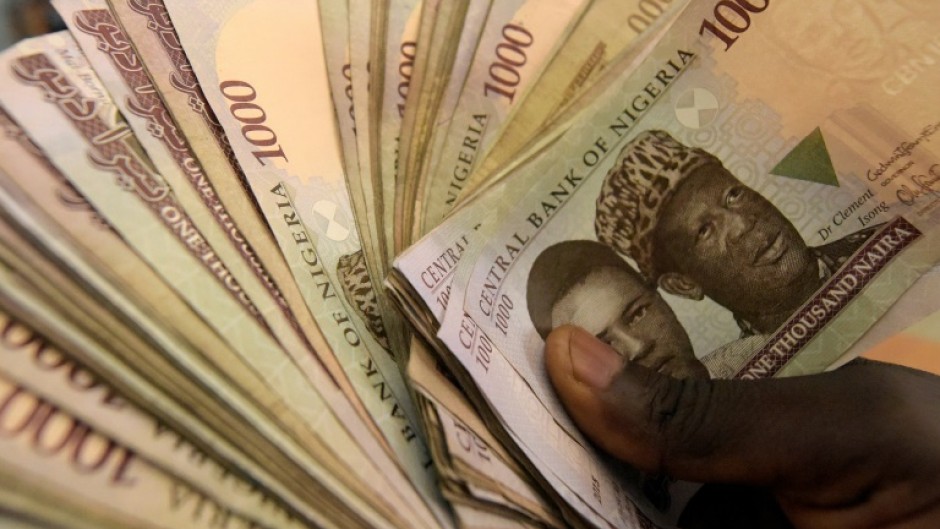LAGOS - Dressed in a sparkling white jacket and sunglasses, the groom grooves with his bride as Afrobeats blast from the towering speakers and relatives slowly join them on the Lagos wedding hall dance floor.
Furtively, almost shyly, one relative slips a few 500 naira notes from her purse and scatters them on the floor. Others follow, but toss their offerings discreetly into silver bowls at their feet.
Gone is the wild, celebratory showering of clouds of naira notes over the heads of the dancing newlyweds, a show of appreciation known as "spraying" that is often a high point in Nigerian weddings, parties or live music performances.
A crackdown by Nigeria's EFCC anti-corruption agency has rapidly changed the culture.
Already, the agency has targeted several celebrities for showering cash in public in a practice officials say disrespects the national currency.
At weddings and concerts, Nigerians are now finding inventive ways to "spray", wary of the EFCC investigators catching them filmed in the act on social media.
At a recent wedding in the Ikeja district of Lagos, guests were encouraged to drop money into silver bowls rather than on the floor, though a few did spray cash briefly if quietly.
The live band, also often showered with cash at celebrations, was adapting.
"People are spraying, but not like before, they don't want any problems," said one band member waiting to perform.
Some partygoers and wedding couples are even creating their own currencies so they can spray legally -- one couple shared a video on social media showing notes printed with their portraits.
Cubana Chief Priest, a celebrity who reached a deal with the EFCC after he was arrested for spraying, appeared recently at another party waving his phone at a singer, gesturing that he had legally transferred money to the band online.
The campaign comes as Nigeria's government looks for ways to stabilise the naira, which has seen a huge slide in value against the dollar since President Bola Ahmed Tinubu came to power and introduced economic reforms a year ago.
For some Nigerian singers, the crackdown has been a blow.
"Minus the booking fee, spraying money is a big part of my income," said singer Speedarlington in an Instagram message.
"If you spray money you go to prison."
- Respect currency -
Nigeria's central bank says "any form of defacement of the currency is a form of ridicule on the nation" that can be punished with imprisonment.
But the law has rarely been enforced before.
For the anti-graft agency, the crackdown and media campaign to educate people is working, even if the practice has long been part of Nigeria's culture.
"As far as the issue of culture is concerned, I don't think spraying or mutilating our currency should be a practice we should continue to encourage," EFCC acting spokesman Wilson Uwujaren told Arise news.
"I don't see any other country in the world where such practice is permissible. We are determined to change that."
- High-profile arrests -
Spraying has its roots in Yoruba culture where dignitaries and performers were handed gifts of appreciation during celebrations, said Professor Ayodele Yusuff at the University of Lagos.
Money is tossed or placed on the head, which is symbolic for Yoruba. Later, the practice spread to Nigeria's other ethnic groups and became a staple at weddings, birthdays and celebrations.
Traditional fuji musicians -- usually a mix of Yoruba language lyrics and drums -- often "hail" celebrities by including them in their songs as they are sprayed.
It is a troubling time for the naira. Since Tinubu came to office in 2023, Nigeria's currency has been battered by the reforms he introduced with a promise they would benefit the country in the long run.
After Tinubu ended a complex exchange system, the naira fell from around 450 naira to the dollar a year ago to around 1,500 naira now.
Already the EFCC's high-profile arrests have curbed enthusiasm for spraying, at least in a very public way.
A court last month sentenced one of Nigeria's most famous LGBTQ celebrities, a transgender woman known as Bobrisky, to six months in jail after she was found guilty of throwing banknotes at a film premiere.
Nigerian actor Oluwadarasimi Omoseyin was also sentenced to six months in prison in February after she was filmed spraying and stepping on banknotes.
But critics have questioned how some powerful figures and politicians filmed spraying were getting away untouched.
For some, the crackdown is a headline-seeking campaign from an agency that should be focused on corruption.
"They've destroyed weddings," said one Lagos attorney at a music event where bands used to be sprayed. "It was the part people enjoyed the most."
- by Patrick Markey
The information contained in the article posted represents the views and opinions of the author and does not necessarily represent the views or opinions of eNCA.com.

